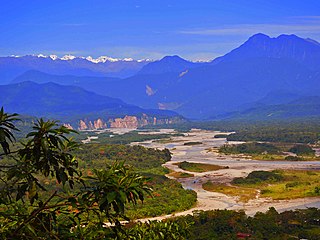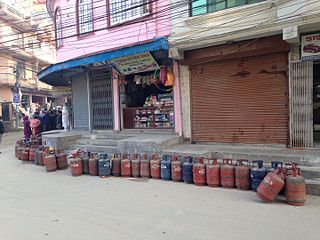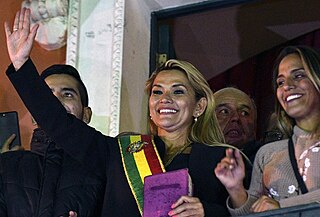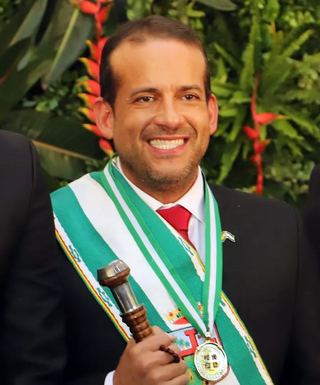
Bolivia, officially the Plurinational State of Bolivia, is a landlocked country located in western-central South America. It is bordered by Brazil to the north and east, Paraguay to the southeast, Argentina to the south, Chile to the southwest, and Peru to the west. The seat of government and administrative capital is La Paz, which contains the executive, legislative, and electoral branches of government, while the constitutional capital is Sucre, the seat of the judiciary. The largest city and principal industrial center is Santa Cruz de la Sierra, located on the Llanos Orientales, a mostly flat region in the east of the country.

La Paz, officially known as Nuestra Señora de La Paz, is the de facto capital of Bolivia and is the seat of government of the Plurinational State of Bolivia. With an estimated 816,044 residents as of 2020, La Paz is the third-most populous city in Bolivia. Its metropolitan area, which is formed by La Paz, El Alto, Achocalla, Viacha, and Mecapaca makes up the second most populous urban area in Bolivia, with a population of 2.2 million, after Santa Cruz de la Sierra with a population of 2.3 million. It is also the capital of the La Paz Department.

Gonzalo Daniel Sánchez de Lozada Sánchez Bustamante, often referred to as Goni, is a Bolivian businessman and politician who served as the 61st president of Bolivia from 1993 to 1997 and from 2002 to 2003. A member of the Revolutionary Nationalist Movement (MNR), he previously served as minister of planning and coordination under Víctor Paz Estenssoro and succeeded him as the MNR's national chief in 1990.

The Bolivian gas conflict was a social confrontation in Bolivia reaching its peak in 2003, centering on the exploitation of the country's vast natural gas reserves. The expression can be extended to refer to the general conflict in Bolivia over the exploitation of gas resources, thus including the 2005 protests and the election of Evo Morales as president. Before these protests, Bolivia had seen a series of similar earlier protests during the Cochabamba protests of 2000, which were against the privatization of the municipal water supply.

Cochabamba, from Quechua qucha or qhucha, meaning "lake", pampa meaning "plain", is one of the nine departments of Bolivia. It is known to be the "granary" of the country because of its variety of agricultural products from its geographical position. It has an area of 55,631 km2. Its population in the 2012 census was 1,758,143. Its capital is the city of Cochabamba, known as the "City of Eternal Spring" and "The Garden City" because of its spring-like temperatures all year.
Events in the year 2006 in Argentina.

The 2008 Bolivian political crisis saw protests against President Evo Morales and calls for greater autonomy for the country's eastern departments. Demonstrators escalated the protests by seizing natural gas infrastructure and government buildings. In response, supporters of the national government and its reform of the constitution, mobilized across these regions.
The history of Bolivia involves thousands of years of human habitation.

The Cochabamba Water War, also known as the Bolivian Water War, was a series of protests that took place in Cochabamba, Bolivia's fourth largest city, between December 1999 and April 2000 in response to the privatization of the city's municipal water supply company SEMAPA. The wave of demonstrations and police violence was described as a public uprising against water prices.

The Presidency of Evo Morales began on January 22, 2006 when Evo Morales was inaugurated as the 80th President of Bolivia, following his victory in the 2005 general election, where he won 53.7% of the vote, defeating Jorge Quiroga, Samuel Doria Medina, and several other candidates. Morales increased taxation on the hydrocarbon industry to bolster social spending, emphasising projects to combat illiteracy, poverty, racism, and sexism. Vocally criticizing neoliberalism and reducing Bolivia's dependence on the World Bank and International Monetary Fund, his administration oversaw strong economic growth while following a policy termed "Evonomics" which sought to move from a liberal economic approach to a mixed economy. Scaling back U.S. influence in the country, he built relationships with leftist governments in the Latin American pink tide and signed Bolivia into the Bolivarian Alliance for the Americas. Attempting to moderate the left-indigenous activist community, his administration also opposed the right-wing autonomist demands of Bolivia's eastern provinces. Winning a recall referendum in 2008, he instituted a new constitution that established Bolivia as a plurinational state and was re-elected in 2009. His second term witnessed the continuation of leftist policies and Bolivia's joining of the Bank of the South and Community of Latin American and Caribbean States; he was again reelected in the 2014 general election. Following the disputed 2019 general election and the ensuing unrest, Morales resigned and flew to Mexico where he had been granted political asylum.

The Federation of Neighborhood Councils-El Alto is a federalist mode of political organization of over 600 neighborhood councils that provide public services, construction and jobs to citizens of El Alto, Bolivia.
The 2011 Bolivian protests were a series of demonstrations by indigenous peoples who opposed the construction of the Villa Tunari – San Ignacio de Moxos Highway through the Isiboro Sécure National Park and Indigenous Territory, the ancestral lands of over 12,000 indigenous residents, from the Chimane, Yuracaré, and Mojeño-Trinitario peoples. The subcentral TIPNIS, the Confederation of Indigenous Peoples of Bolivia (CIDOB), and the highland indigenous confederation CONAMAQ—supported by other indigenous and environmental groups—organised a march from Trinidad, Beni to the national capital La Paz in opposition to the project, beginning on 15 August 2011.

The 2015 Nepal blockade, which began on 23 September 2015 and lasted about six months, was an economic and humanitarian crisis that severely affected Nepal and its economy.

The 2019 Bolivian protests, also known as the Pitita Revolution, were protests and marches from 21 October 2019 until late November of that year in Bolivia, in response to claims of electoral fraud in the 2019 general election of 20 October. After 11 November 2019, there were protests by supporters of the outgoing government in response to Jeanine Áñez becoming the acting president of Bolivia. The claims of fraud were made after the suspension of the preliminary vote count, in which incumbent Evo Morales was not leading by a large enough margin (10%) to avoid a runoff, and the subsequent publication of the official count, in which Morales won by just over 10%. Some international observers expressed concern over the integrity of the elections.

A political crisis occurred in Bolivia on 10 November 2019, after 21 days of civil protests following the disputed 2019 Bolivian general election in which incumbent President Evo Morales was initially declared the winner. The elections took place after a referendum to amend the Bolivian constitution, which limits the number of terms to two, was rejected in 2016. In 2017 under political pressure and a legal demand from the Morales government, the Constitutional Tribunal (TCP) ruled that all public offices would have no term limits despite what was established in the constitution and allowing Evo Morales to run for a fourth term.

Luis Fernando Camacho Vaca is a Bolivian activist, businessman, lawyer, and politician serving as the 2nd governor of Santa Cruz since 2021. He is the leader of Creemos, opposition bench in the Plurinational Legislative Assembly and was the chair of the Santa Cruz Civic Committee in 2019.
The 2019 Senkata massacre occurred when Bolivian soldiers and police broke up a road blockade at the YPFB gas facility in Senkata, El Alto, Bolivia, on 19 November 2019. It occurred one week into the interim presidency of Jeanine Áñez and four days after the Sacaba massacre. Rural and urban protesters had blockaded the plant shortly after the ouster of Bolivian president Evo Morales. Their protests were part of nationwide blockades by his supporters denouncing the ouster as a coup d'état, and urban protests in El Alto against the new government's desecration of the wiphala, an Indigenous flag designated a Bolivian national symbol by the 2009 Constitution. By 14 November, protesters had built barricades as part of their blockade.

The 2003 La Paz riots, commonly referred to as Black February, was a period of civil unrest in La Paz, Bolivia, that took place between 12 and 13 February 2003. The riots were instigated by the imposition of a progressive salary tax—dubbed the impuestazo—aimed at meeting the International Monetary Fund's goal of reducing the country's fiscal deficit from 8.7% of GDP to 5.5%. The legislation mobilized a diverse array of groups against the proposal, including business sectors, trade unions, and university students.
The socioeconomic and political crisis in Haiti has been marked by rising energy prices due to the 2022 global energy crisis, as well as protests, and civil unrest against the government of Haiti, armed gang violence, an outbreak of cholera, shortages of fuel and clean drinking water, as well as widespread acute hunger. It is a continuation of instability and protests that began in 2018.
The following is a chronology of notable events from the year 2023 in Bolivia.













